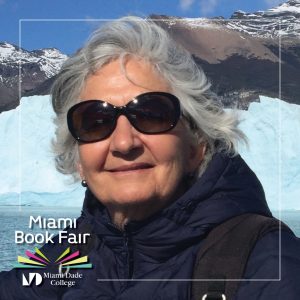
Ileana Oroza came to the United States from Cuba in 1961 to live with family in Miami as part of Operación Peter Pan. She relocated to Puerto Rico to finish high school and attend university before returning to the Magic City in the seventies, and she’s been here ever since. A longtime MBF attendee and Friend of the Fair, she’s also a member of a very active book club and loves to travel.
How did you first learn about Miami Book Fair?
I worked in the arts section at the Miami Herald, so I and the rest of the staff were very aware of anything going on locally, culture-wise. That was the time when everything was happening downtown – Book Fair, the ballet, the film festival, the art museum. It was a very exciting time for the city.
That’s a nice segue to my next question: Thinking about what downtown Miami used to be and what the perception of Miami was in general for folks who didn’t live here, what do you think the Fair has brought to the city and what has it brought to you personally?
A seat at the global cultural table. Through the Fair and the other institutions I mentioned, Miami came into its own culturally. To me, the Fair is just like Christmas but every November. [laughs] I just love it – it’s a wonderful way to connect with people and you get to see so many authors that you’ve read and never would have thought you’d see in person or exchange words with. But I think one of the most important things the Fair does is its work for the children in our community. I’m always impressed by that side of it, and how it brings literature to life for kids as a real, living thing and not some schooltime drudgery.
What are your favorite FOTF benefits?
Getting good seats at Chapman! [laughs] That and being able to see the schedule ahead of time. The year-round FOTF author events and receptions are really great, too. I took my whole book club to see Mary Morris earlier this month.
How do you Book Fair – solo or with family or friends?
The answer to that is yes! [both laugh]
What’s an MBF moment or experience that really stands out for you?
One year I had a friend from out of town visiting, in part to see Ben Fountain, who was a student of hers at UNC. He was appearing on a panel with Madison Smartt Bell and somehow or another we all ended up talking afterward. And before I knew it, we were all at my house having an impromptu dinner party.
That’s so cool!
Yves Colon, the journalist, and his wife, Melissa, also came. It was great!
You’re a Friend, you support the Fair, and you’re in a book club, so I know you read a lot of good books. What’s a recent one?
The Correspondent by Virginia Evans. I’m 75, and while I love to read books about young people, I also like to read about people of my generation and there aren’t many out there. The book is about a seventysomething woman named Sybil who corresponds with all kinds of people throughout her life, including Joan Didion, who writes back. I was really charmed by it. Up next is a memoir by Gayle Young, a friend of a friend who was a bureau chief for CNN in Cairo – I actually visited her when I was there. It just came out and it’s called Update: Reporting From an Ancient Land. I’m also looking forward to Anne Berest’s new book, Gabriële, which she wrote with her sister Claire. That one is about their great-grandmother Gabriele Buffet-Picabia, who was married to the French artist Francis Picabia.
Which MBF 2024 program did you find most engaging?
You know I can’t remember if it was last year or the year before, but I still think about a panel of four young Latinos from Miami who spoke about the future of the city, and one of them, Andrew Otazo – he wrote The Miami Creation Myth – was there and he was dressed as a croqueta. [both laugh] When I got there and saw that I thought to myself, This is going to be terrible! But it was the most interesting and smart conversation. It was great to hear these young people talk about Miami and share their perspectives.
What’s the best book-to-screen adaptation you’ve seen and why?
Any Merchant Ivory film from the eighties or nineties, like A Room wIth a View or The Remains of the Day. Those movies and the books they’re adapted from just transport you. You never left the theater disappointed after seeing them and they made you want to read those books again.
If MBF came to you and said, “Who do you most want to see at this year’s Fair?” who would that author be and what would you ask them?
There’s a Chilean writer named Benjamin Labatut who wrote The Maniac and When We Cease to Understand the World. They explore either the birth of AI, AI, or quantum physics. He tells the most brilliant, interesting stories, and I’d ask him how he walks that fine line between fiction – which he does – and real people, which he uses in his novels to discuss very complicated issues in very approachable terms.
Interview by Elisa Chemayne Agostinho; responses have been edited for space and clarity.